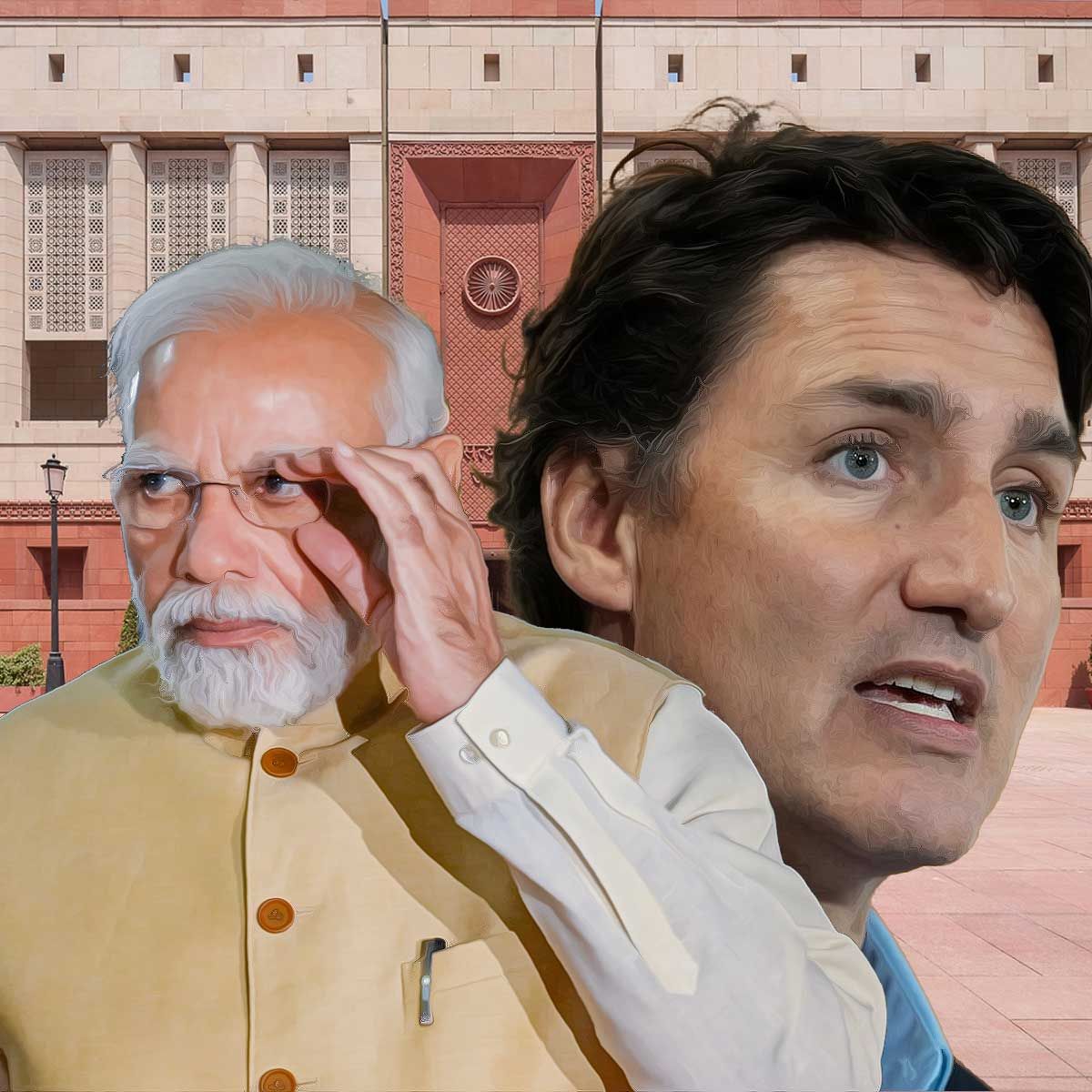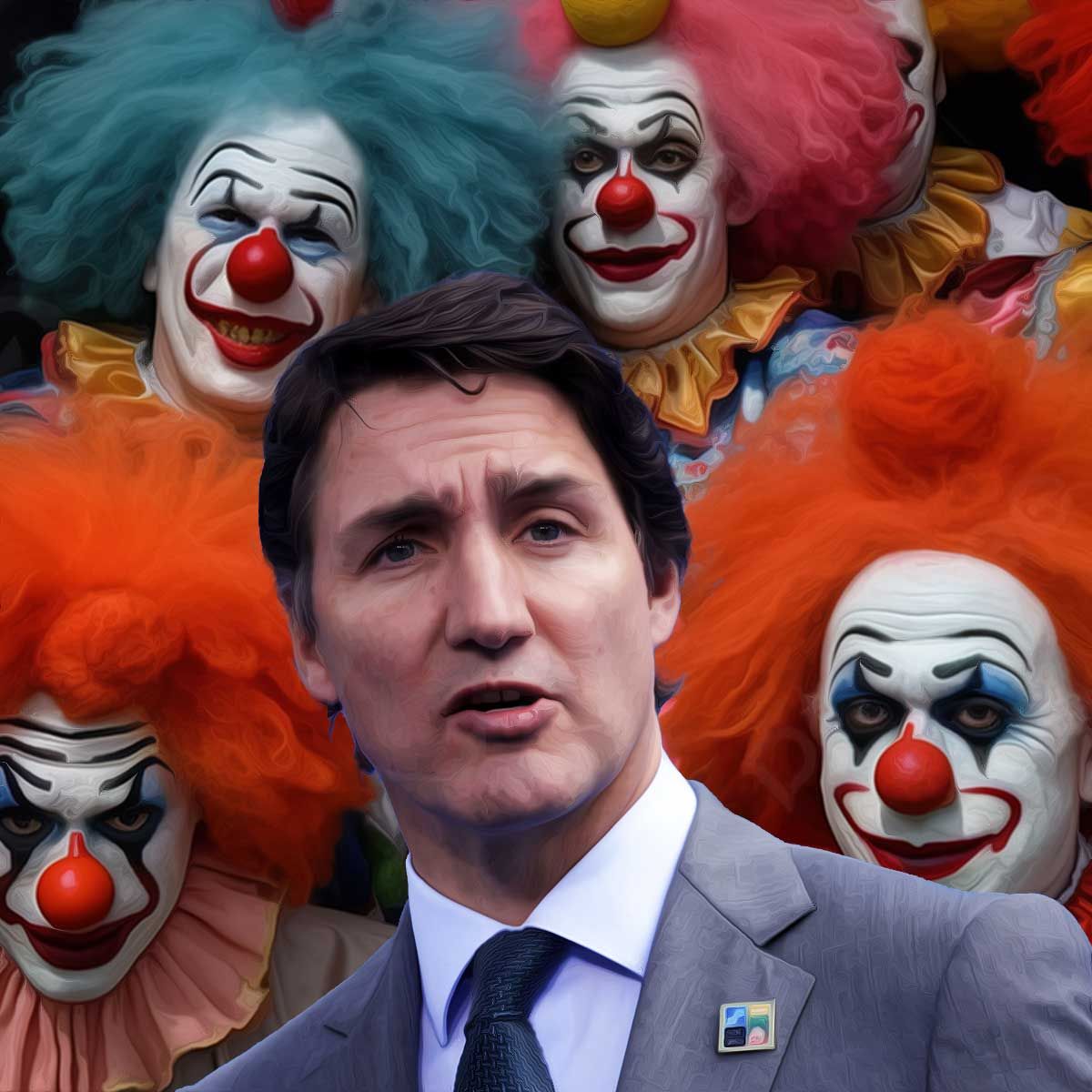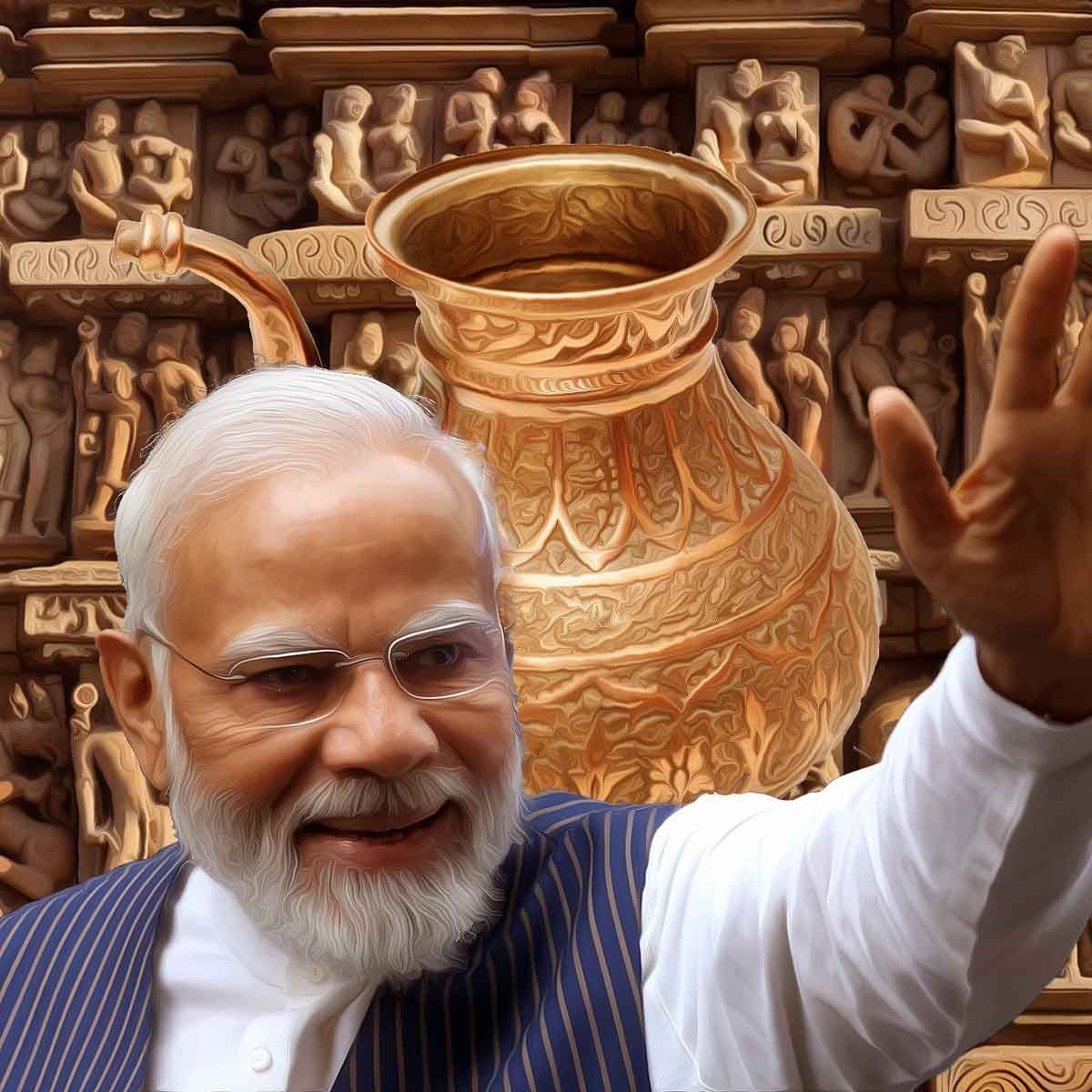MORE COVERAGE
Twitter Coverage
Satyaagrah
Written on
Satyaagrah
Written on
Satyaagrah
Written on
Satyaagrah
Written on
Satyaagrah
Written on
JOIN SATYAAGRAH SOCIAL MEDIA
"New India, NaMoIndia": Under PM Modi's resolute leadership, India stands firm in the face-off with Canada, leading to a comedic exit of 41 Canadian diplomats, India's new era of assertiveness clearly doesn't mesh with Canada's silly diplomatic approach

In a recent turn of events that has caught the world's attention, Canada's Foreign Minister, Melanie Joly, made a significant announcement this Thursday. Amid the escalating tensions between India and Canada, she confirmed that Canada has decided to withdraw 41 of its diplomats, along with their 42 family members, from India.
|
Joly stated, "As of now, I can confirm that India has formally conveyed its plan to unethically remove diplomatic immunities for all but 21 Canadian diplomats and dependents in Delhi by tomorrow, October 20." She further elucidated on the gravity of the situation by adding, "This means 41 Canadian diplomats and their 42 dependents were in danger of having immunity stripped on an arbitrary date. And this would put their personal safety at risk."
While the immediate concern is the safety of diplomats, this move is a stark reflection of the strained ties between the two nations, primarily centered around the Khalistani separatist issue. The audacious step by Canada is a testament to the changing dynamics of international relations.
Following India's decision to suspend visa operations to Canada and its call for a reduction in Canadian diplomats on its soil, the diplomatic relations between the two nations have been strained. India's stance, emphasizing 'parity', is indicative of the country's assertiveness in handling international affairs.
The Canadian Foreign Minister, addressing the situation, explicitly stated, "...we have facilitated their safe departure from India. This means that our diplomats and their families have now left diplomatic immunities. Keep diplomats safe, no matter where they’re from and where they’re sent to. Immunities allow diplomats to do their work without fear of reprisal or arrests from the country they’re in." This statement underscores the critical importance of diplomatic immunities, portraying them as a protective shield for diplomats, ensuring they can perform their duties without apprehensions.
Elaborating on this, she emphasized, "They are a fundamental principle of diplomacy and this is a two-way street. They only work if every country abides by the rules." The Foreign Minister's words reflect Canada's belief in adhering to established international norms. She further cautioned against any unilateral actions, saying, "A unilateral revocation of diplomatic privilege and immunities is contrary to international law. It is a clear violation of the Vienna Convention on Diplomatic Relations and threatening to do so is unreasonable and escalatory. If we allow the norm of diplomatic immunity to be broken no diplomats anywhere on the planet would be safe."
Her concluding remark, sourced from CTV news, that Canada "will not reciprocate," indicates Canada's intention to avoid an escalation and perhaps, find a diplomatic solution to the ongoing dispute.
The strain in diplomatic relations between India and Canada has led to practical repercussions affecting citizens of both nations. In a joint announcement with Immigration, Refugees and Citizenship Minister Marc Miller, the Canadian Foreign Minister elucidated the repercussions of India's recent decisions on their diplomatic service delivery.
|
Speaking on the matter, she clarified, "There’s no question that India’s decision will impact the levels of services to citizens in both countries. Unfortunately, we have to put a pause on all in-person services in our consulates in Chandigarh, Mumbai and in Bangalore." This statement underscores the immediate effects of the diplomatic standoff, with citizens being the unintended recipients of the strain in bilateral relations.
However, offering a glimmer of hope and continuity amidst the challenges, she added, "Canadians who need consular assistance can still visit our High Commission in Delhi. And you can still also do that in person by phone and by email." This serves as an assurance to Canadian citizens in India that, despite the escalating tensions, they will not be left unsupported. It's evident that while political dynamics shift and sway, efforts are being made to ensure minimal disruption to the common people.
|
Canadian Prime Minister Justin Trudeau found himself in the spotlight as he faced questions regarding the Indian government's ultimatum set for October 10th. The ultimatum demanded Ottawa to substantially curtail its diplomatic presence in India.
When probed about the situation, Trudeau opted for a restrained response, leaving the specifics for Foreign Minister Joly to address later. However, he did emphasize Canada's continued diplomatic outreach, stating, "We have been continually engaged in diplomacy and in dialogue with the Indian government," as reported by CTV News. His remarks underscored the gravity of the situation, with him adding, "This is a serious matter that we are taking extremely seriously."
On the other side, the Ministry of External Affairs in India clarified its stance, emphasizing its objective of achieving 'parity' in the diplomatic presence between the two nations. The Indian authorities have expressed concerns over what they perceive as Canada's persistent "interference" in India's "internal matters", leading to the call for a reduction in Canadian diplomats stationed in the country.
|
The recent developments in the diplomatic rift between India and Canada took another turn when MEA spokesperson, Arindam Bagchi, addressed a press briefing. Bagchi shed light on India's perspective, emphasizing the country's concerns over the disproportion in the number of diplomats and their interference in India's internal affairs.
Bagchi stated, “Given the much higher presence of diplomats or diplomatic presence here…and their continued interference in our internal matters, we have sought parity in our respective diplomatic presence. Discussions are ongoing on the modalities of achieving this”. He further indicated that a reduction in the Canadian diplomatic presence in India could be anticipated, suggesting, "Given that Canadian diplomatic presence is higher, we would assume that there would be a reduction."
|
A significant point of concern raised during the briefing was the potential impact of this reduction on visa processing by the Canadian High Commission in India. In response, Bagchi clarified that staffing decisions at the High Commission rested with the Canadian side. He said, “It’s up to the Canadian side, who they choose to staff the High Commission with…our concerns are related to ensuring parity in diplomatic presence”. He underscored India's primary objectives, which are creating an environment in Canada conducive for Indian diplomats and establishing an equal diplomatic presence.
In a surprising twist, Canadian Prime Minister Justin Trudeau made a grave allegation, suggesting the involvement of the Indian government in the fatal shooting of Nijjar.
Trudeau claimed, based on his national security officials' input, that "agents of the Indian government" were responsible for the assassination of Canadian citizen Hardeep Singh Nijjar, who held the position of president at Surrey’s Guru Nanak Sikh Gurdwara.
|
India swiftly countered this allegation, labeling it as 'absurd' and 'motivated'. It's significant to note that Canada has not presented any concrete evidence to substantiate Trudeau's claim regarding Nijjar's killing. Nijjar, recognized as a terrorist by India, met his tragic end on June 18, when he was shot in a parking area outside a Gurdwara in Surrey, British Columbia.
Yet, the evolving India-Canada dispute is merely a chapter in the broader narrative of India's emerging diplomatic assertiveness. Under Prime Minister Narendra Modi's leadership, India has taken several decisive steps, showcasing its independent stance on global issues. The nation's neutral position concerning the Russia-Ukraine conflict and its formidable response to China's aggression in the Galwan Valley attest to India's newfound confidence on the international stage.
These decisions underscore a message to the global community: India, in its current era, is not a nation to be influenced or pressured by global superpowers.
|
The Diplomatic Mastery of Prime Minister Modi
When Narendra Modi assumed the role of India's Prime Minister in May 2014, he brought with him the reputation of being a three-time Chief Minister of Gujarat, with little exposure to the intricate dynamics of international relations. However, the corridors of Lutyens’ Delhi soon echoed with tales of his unexpected prowess in diplomacy. Far from being a novice, Modi emerged as a seasoned player on the global stage, deftly weaving a tapestry of relationships with leaders worldwide.
At the heart of PM Modi's foreign policy is a novel approach: one that does away with binding, singular alliances. Instead, he has championed a multi-faceted strategy, focusing on issue-based partnerships. This pivot has repositioned India as an invaluable ally, a sought-after partner in global affairs. A testament to his diplomatic acumen is his ability to embrace leaders from rival nations with equal warmth. The world witnessed Modi's diplomatic finesse as he shared camaraderie with both US President Joe Biden and Russian President Vladimir Putin, irrespective of the cold dynamics between the two superpowers.
|
Perhaps, Modi's unique strength lies in his candid communication. Not many leaders can candidly advise Putin, asserting that this era isn't one for wars. Simultaneously, through Foreign Minister S Jaishankar, he made it clear to the West that Europe's concerns don't necessarily translate into global issues. Yet, amidst these bold statements, India has skillfully retained amicable ties with all parties. It's a delicate balancing act, and PM Modi seems to navigate it with unparalleled grace and conviction.
The West, particularly the United States, was eager to rally allies, and India, with its growing global stature, was a prime target for their diplomatic overtures.
However, India charted a distinct course, showcasing a diplomatic maturity that surprised many. Despite being under considerable pressure from Western powers, India chose a path of neutrality, refusing to be swayed by any external influence. This stance was not just a reflection of India's independent foreign policy but also a clear message to the world that the nation was no longer susceptible to external pressures.
Interestingly, India's decision to remain impartial didn't alienate its ties with the West. Instead, it was met with a grudging respect. This was evident as, in the aftermath of the conflict, collaborations between India and the U.S. remained robust across various sectors, ranging from business and technology to security and education. This resilience in the relationship underscores a newfound respect for India's diplomatic decisions and its commitment to acting in its national interest.
India's Resilient Stand against China's Aggression in Galwan
The Galwan Valley clash of June 2020 marked a pivotal moment in the Indo-China relationship. A land that had witnessed relative peace for decades suddenly became the focal point of international attention. The fatal confrontation between Indian and Chinese troops was a grim reminder of the deep-rooted tensions simmering beneath the surface.
China, perhaps relying on historical precedents like its victory in 1962, might have anticipated a less assertive response from India. However, the Indian response, under the Modi administration, was swift and unwavering. The decision to impose trade restrictions on Chinese entities was not just a strategic move, but also a symbolic one, indicating India's determination to prioritize its national interests.
While diplomatic and military talks ensued, India's proactive maneuvers on the ground, especially the strategic occupation near Pangong Tso, showcased a nation ready to defend its territorial integrity. This move, among others, clearly took China by surprise, highlighting the unpredictability and strength of India's defense strategies.
Prime Minister Modi's leadership during this crisis reaffirmed India's commitment to its sovereign borders. The message was clear: India, in the modern geopolitical landscape, is not a nation that can be easily intimidated or bullied. The world watched, and the narrative shifted, recognizing India as a formidable power in the region, ready to stand its ground against any form of aggression.
 Support Us
Support Us
Satyagraha was born from the heart of our land, with an undying aim to unveil the true essence of Bharat. It seeks to illuminate the hidden tales of our valiant freedom fighters and the rich chronicles that haven't yet sung their complete melody in the mainstream.
While platforms like NDTV and 'The Wire' effortlessly garner funds under the banner of safeguarding democracy, we at Satyagraha walk a different path. Our strength and resonance come from you. In this journey to weave a stronger Bharat, every little contribution amplifies our voice. Let's come together, contribute as you can, and champion the true spirit of our nation.
 |  |  |
| ICICI Bank of Satyaagrah | Razorpay Bank of Satyaagrah | PayPal Bank of Satyaagrah - For International Payments |
If all above doesn't work, then try the LINK below:
Please share the article on other platforms
DISCLAIMER: The author is solely responsible for the views expressed in this article. The author carries the responsibility for citing and/or licensing of images utilized within the text. The website also frequently uses non-commercial images for representational purposes only in line with the article. We are not responsible for the authenticity of such images. If some images have a copyright issue, we request the person/entity to contact us at satyaagrahindia@gmail.com and we will take the necessary actions to resolve the issue.
Related Articles
- "Unity, not division, is the foundation for progress and peace": Escalating Tensions in Canada: Indian diaspora holding the Tricolour, counters Khalistani separatists outside the consulate to protect their diplomats amidst Trudeau's political predicament
- "Nations stand tall when they stand firm": Amid soaring India-Canada tensions, India strikes a decisive blow against Khalistanis, seizing assets of Sikhs For Justice chief Gurpatwant Singh Pannun & Hardeep Singh Nijjar, reshaping geopolitical landscape
- Sikhs for Justice accused Russia of aiding India’s RA&W in killing Khalistani terrorist Nijjar; Russia denied claims, called SFJ’s $25K reward for tracking diplomats unacceptable, sought law enforcement action, and protection under Vienna Convention laws
- "Face the future, say 'bring it on'": NIA lists 43 top criminals, including Canada-based with Khalistani ties, as tensions rise, Trudeau implicates India in Nijjar's Canada murder; India promptly refutes, calling the accusation 'absurd and motivated'
- "Home of the free, especially for the 'wanted'": From harboring Khalistanis like Nijjar to shielding the assassin of Sheikh Mujib, Nur Chowdhury, Canada's actions reveals its double standards and raise critical questions about the nation's true values
- "Canada National Sport - The Blame Game": Indian High Commissioner challenges Canada's 'conviction' of India in Nijjar case, emphasizing the importance of a thorough & conclusive investigation before drawing conclusions in international diplomatic affairs
- Amidst Trudeau's allegations against India, Sri Lanka condemns Canada's double standards, highlighting Ottawa's controversial recognition of a Nazi veteran and its past accusations of 'Tamil Genocide', Canada's international image is under severe scrutiny
- Justin Trudeau, who admitted past marijuana use, denies 'credible rumors' from ex-Indian diplomat Deepak Vohra of his plane carrying cocaine in India, Trudeau missed G20 dinner and stayed secluded for two days, possibly high on drugs
- Trudeau leverages Khalistan narrative against India with US intelligence backing. SFJ's G.S Pannu, with dual US-Canada citizenship, incites against Indian diplomats, leading to speculations about potential CIA ties as shared by India's intelligence head
- "Life deals you a lot lessons, some people learn from it, some people don't": Notorious Khalistani terrorist & radical separatist Hardeep Singh Nijjar shot dead within the premises of the Guru Nanak Sikh Gurdwara Sahib in Surrey, British Columbia, Canada
- Amid rising tensions, Sikhs and Hindus held an anti-Justin Trudeau protest at the Canadian Embassy in Delhi over attacks on Hindu temples by Khalistanis, Trudeau acknowledged Khalistani presence as India-Canada relations worsen after Nijjar's killing
- 28-year-old Khalistani terrorist Arshdeep Dalla, an aide to Hardeep Singh Nijjar detained in Canada, linked to murders, extortion and terror modules in Punjab, his associates remain active as Indian extradition efforts face hurdles amid diplomatic tension
- "Turbulence tests the strength of community bonds": Hindu temple in Canada faces vandalism by Khalistan supporters, spotlighting escalating tensions after Khalistani activist Hardeep Singh Nijjar's death, What's next for the Hindu community abroad
- "Separate we come, and separate we go, And this be it known, is all that we know": India deeply objects to politically motivated “farcical exercise” in name of a referendum carried out by Khalistanii elements in Canada, matter taken up with authorities
- "From Father to Son: A Troubling Legacy": In a sinister echo of the past, Canadian PM Trudeau openly endorses Khalistani elements against India, uncovering the dark history of Pierre Trudeau shielding notorious Kanishka bombing mastermind Talwinder Parmar

























